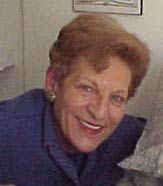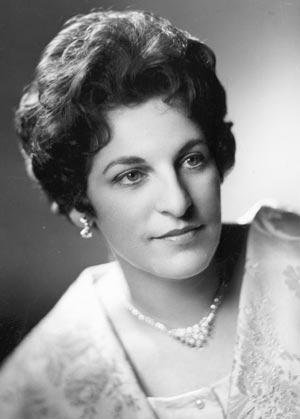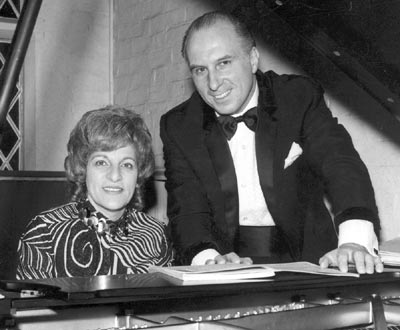BAFA © 2010. All material here is copyrighted. See conditions above. |
Sylvia Schulman Benatar
pianist, South Africa.
|

Sylvia Shulman Benatar, 2003.
|
I was born in Bulawayo, Southern Rhodesia (now Zimbabwe) in 1925, of extremely musical Jewish parents. I started playing the piano at the age of 4 in the Belgian Congo and had formal lessons from one year later. When I was eight years old we moved to England where I had an excellent teacher but we moved back to Africa four years later, this time to the Copperbelt of Northern Rhodesia.
By this time I was already playing advanced pieces of music and was sent to boarding school in Cape Town because the musical advantages there were purported to be greater than anywhere else in Southern Africa. |
Here there were annual Eisteddfods at which I entered many different sections, which gave a good basis for my future concert work. I was also chosen to play the Mendelssohn G Minor Piano Concerto with the Cape Town Municipal Orchestra during my final year. After matriculating at 16 I went to the South African College of Music (part of the University of Cape Town) for 4 years and gained a Performer's Diploma as well as a Performer's Licentiate of the University of South Africa.
For two or three years I was the College's official accompanist and as a result of exposure at various concerts was frequently asked to broadcast on SABC radio - in those days it was all live! I also performed Concerti with the Cape Town Municipal Orchestra and the SABC Orchestra in Cape Town and Johannesburg. In 1948 I decided to leave Cape Town and go to Salisbury in Southern Rhodesia. There I met my husband, "Sue"(Salvator) Benatar and we were married later that year.
I did not play the piano for 5 years after that! Then I was persuaded to start again and was soon in demand, mainly as accompanist and chamber music player. My husband's family was very large and were all from the Sephardic Jewish Community.
|

Sylvia Shulman Benatar in 1960.
|
In 1954 we met Dr. Kenneth and Mrs. Roberta Christian, American Bahá'í pioneers, Knights of Bahá'u'lláh for Southern Rhodesia. We had never heard of the Bahá'í Faith and the Christians never mentioned religion to us, under strict instructions by the Guardian to teach the indigenous peoples, not the settlers! As we assumed they were Christian and we were Jewish we never spoke about religion to them anyway. But we became very close friends. They left after 6 months to go to Greece and 6 months after that we were contacted by Larry and Carol Hautz, new Bahá'ís to the country. They lost no time telling us about the Faith and we became Bahá'ís in April 1955, just in time to form the first Local Spiritual Assembly in Southern Rhodesia. This caused quite an upset in the Benatar family, in fact, in the whole of the Sephardic Community!
"Sue"'s line of work was in photography and I worked on and off in various bookkeeping jobs, all the while keeping in the public eye with occasional concerts. So it was in December of 1955 that I was asked to play for a young student, home on holiday from Rhodes University, at a concert for the Salisbury Music Club. |
This turned out to be Norman Bailey who later became one of the world's great Wagnerian bass-baritones. Norman had originally gone to University to study theology but was persuaded to take up music instead because of his outstanding voice. He was very attracted to the Bahá'í Faith and became a Bahá'í in 1956.
"Sue" and I were very active Bahá'ís and served on various Committees and the local Assembly. In 1956 our son Mark was born, and our daughter Odette arrived in 1960. In the meantime I was continuing with music, sometimes playing solo both in Salisbury and Bulawayo, and touring with visiting artists as well as Norman Bailey.
|

Sylvia Shulman Benatar and Norman Bailey at the piano.
|
He married and went overseas to further his career and came back on holiday after being engaged for leading roles in Austria. I was amazed at his improvement when we went on tour then and again a year later, when the improvement was even greater.
|
This and playing for other experienced overseas artists gave me a longing to go overseas myself and improve my own standards. So "Sue" and I decided that moving to England would be a good for the children as well for his advancement in the photographic field. We also felt that we needed more Bahá'í deepening than we were able to get in Salisbury. We burnt our bridges behind us and sailed for the UK at the beginning of 1963 arriving shortly before the first Bahá'í World Congress in London. We had very little money, no jobs and 2 very young children!
Lois Hainsworth who, with husband Philip and children, were pioneering in Kampala, Uganda, at the time, had contacted me before we left Rhodesia and asked me to accompany her for a recital at the Wigmore Hall in London. This was an exciting offer and I had lessons with the famous accompanist, Ivor Newton, in preparation for this. One of the first things "Sue" and I did after we found "digs" in Upper Norwood was to buy a grand piano on hire purchase so that I could practise.
|
The successful recital took place almost immediately after the World Congress. The programme included a song composed by Daniel Jordan. He was in London and helped us with the interpretation.
In due course we settled in Cambridge which proved to be a good move. The Bahá'í community was small and consisted of Hand of the Cause John Ferraby and his wife Dorothy, among other Bahá'ís. At the same time I was meeting and playing with many excellent musicians, forming a partnership with a cellist, Pamela Hind-O'Malley, as the Cambridge Duo. We played all over the country over a period of three years. This overlapped with my being invited to accompany one of Britain's leading concert and oratorio singers, John Carol Case. I also played with him all over England for three years and broadcast on BBC Radio 3.
I decided to concentrate on solo work as well and had lessons first with Joel Ryce, husband of Yaltah Menuhin, and then with Louis Kentner, brother-in-law of Yehudi Menuhin. These were great opportunities to make known the name of the Bahá'í Faith in this stratum of society! There were concerts with local orchestras and appearances at the Cambridge Festival which included playing the Beethoven Third Piano Concerto at the famous Senate House. I also taught at the Cambridge Grammar School for Girls and the Grammar School for Boys at different times, as well as the Perse School for Girls. After 8 years we home-front pioneered to Bedford and stayed there for 5 years. "Sue"and I with the children attended Summer Schools and Weekend Schools and I was invariably involved in musical performances, often with Lois Hainsworth.
In all this time I was constantly in touch with Norman Bailey who moved from Austria to Germany, then to England.and coincidentally, eventually to Bedford. We gave a performance during the period of the Dedication of the Frankfurt Temple in 1964 and later, after he moved with his family to England, we performed together in Iceland during the Oceanic Bahá'í Conference in 1971. There were many other performances of a professional nature over the years and one notable one was at Harewood House in Yorkshire, the home of the Earl of Harewood, cousin of the Queen. They held very prestigious Concert Series there and we were very privileged to be invited to give a recital. By this time though, Norman was very well known for his Wagnerian and other roles at the English National Opera in London, at Bayreuth and other major opera houses of the world. He was eventually awarded the CBE for his services to English opera. We also made several broadcast recordings for the BBC which were aired on Radio 3.
We initiated what we called "Musical Firesides" when we would perform songs and piano pieces interspersed with information about the Bahá'í Faith. I did several of these with Lois Hainsworth as well. Later, in the year before "Sue" and I, with our daughter Odette, returned to South Africa, I devised a programme called "Sylvia Schulman plays Piano Music for You (from W.A. Mozart to Billy Mayerl)" and offered it to Bahá'í Communities throughout the UK. There were many concerts of this nature in 1977 which took place from the south of England to the Highlands and Islands of the UK.
In 1972 Norman Bailey and I toured South Africa for the Cape Performing Arts Board and the Performing Arts Council of the Transvaal, giving recitals in all the major cities. We also did a broadcast recital for the SABC which was aired for many years after that. This was a good opportunity for me to visit family and meet Bahá'ís in all the different places, some of whom were old friends.
In 1977 I decided to go to an Easter Course held at Wavendon by Cleo Laine and John Dankworth, hoping to learn something about jazz. Instead I was roped in to accompany all Cleo's students! I was then invited to play at both the students' and teachers' concerts at the end of the course. Here I accompanied Cleo Laine and also Jack Brymer, the principal clarinettist of the BBC Orchestra.
Back in Cape Town I contacted the Cape Town Symphony Orchestra and almost every year I played a concerto with them. I was also employed on an ad hoc basis by the Cape Performing Arts Board to go on various tours of the Cape Province and to play for rehearsals of operas and musicals. In 1978 I played for a tour of the major cities of the Cape of the opera "Madama Butterfly". (No orchestra!) There were also many recitals with various singers and instrumentalists and broadcasts for the SABC. For fourteen years I was rehearsal and concert pianist for the Philharmonia Choir of Cape Town and I was also conductor of the Reform Synagogue Choir over the same period of time.
"Sue" and I served on the Local Spiritual Assembly of Cape Town for a number of years before moving out of the limits to a virgin area of Cape Town. We joined in with all the Cape Town activities, did a great deal of travel teaching and were on various National Committees. Odette married an English Bahá'í who was in Cape Town for about 7 years and they eventually moved back to the UK. Our son Mark, who was at University in England when we moved to South Africa, worked in South Africa for a year between his University years and married a Bahá'í of Malay background from the Cape Town community. As it was during the apartheid years and mixed marriages were not allowed, they married in England and remained there.
In 1995 my husband died of a rare form of leukemia and I continued with the musical jobs that I had. I was thinking of doing home-front pioneering to Grahamstown with another Bahá'í friend when, early in 1977, I received a call from the National Spiritual Assembly inviting me to come to Johannesburg as Office Manager at the National Bahá'í Centre. At the age of 72 I was overjoyed to be given such a job and made immediate plans to sell the house and buy one in Johannesburg. Within 2 months I was settled and in the office!
About a year later I received a phone call from a singer I had met in Cape Town many years before who was now teaching in Johannesburg and living very close to my home. He had heard through the musical grapevine that I was here and he asked me to accompany him for some recitals for his students. Since then there have been many musical opportunities growing from that contact. Of course, with a full time extremely busy job at the National Centre, I do not have much time for the music but I am pianist for the prize winning Gauteng Choristers and at times for other competitive choirs, I play for many of the Alessandro Ensemble concerts, and I am frequently asked to play for other singers. At my house I have "Musical Firesides" from time to time, inviting other performers to join me.
Edith Johnson lives in the house with me and Lowell Johnson has built a flat adjoining my house. We call ourselves the Bahá'í Youth Group of Roodepoort!
|

Arts Dialogue, Dintel 20, NL 7333 MC, Apeldoorn, The Netherlands
email: bafa@bahai-library.com
|
|


